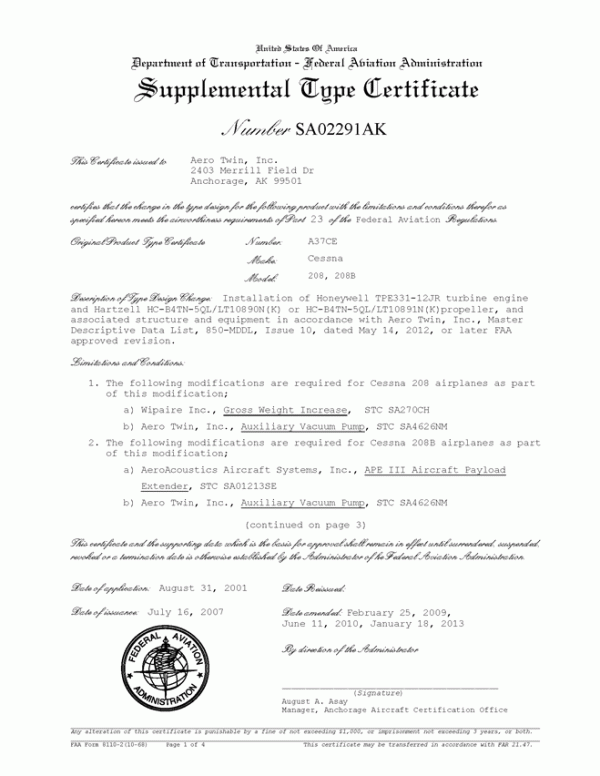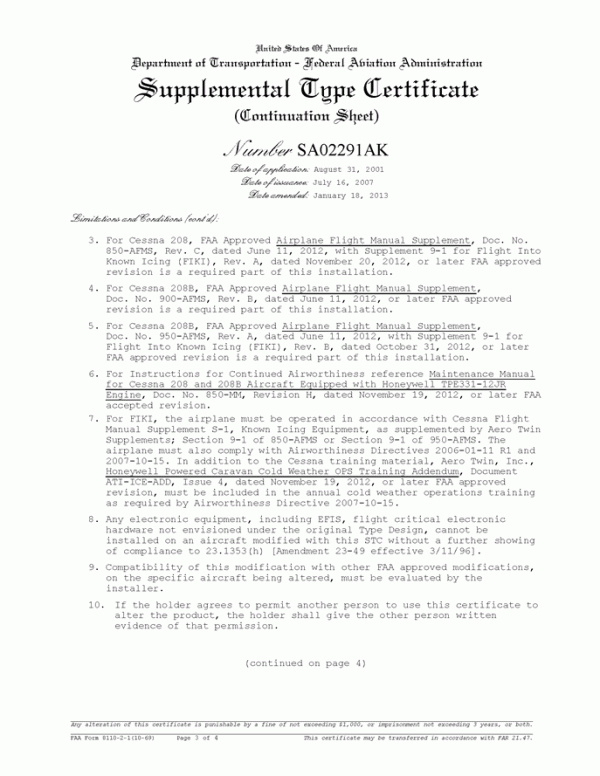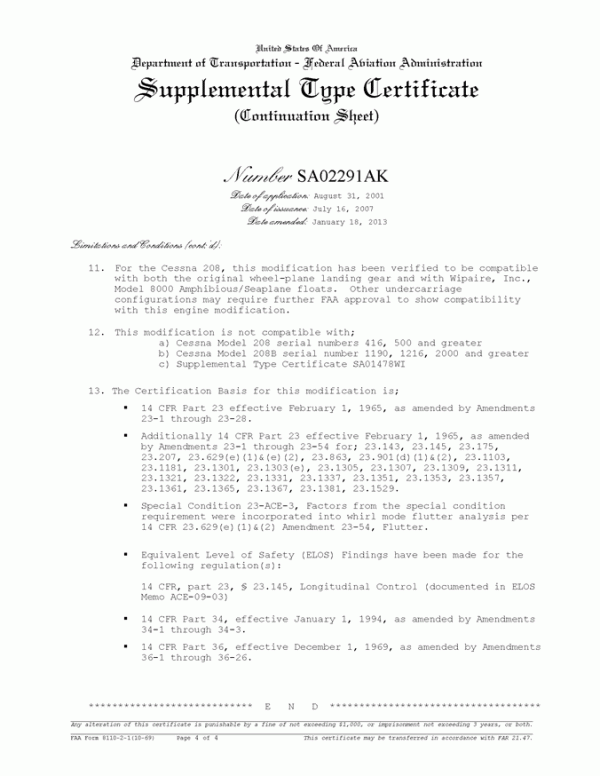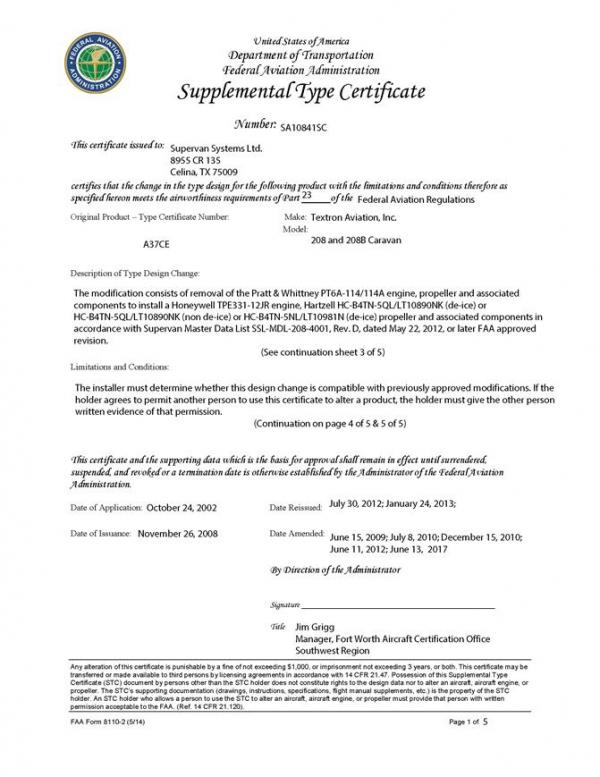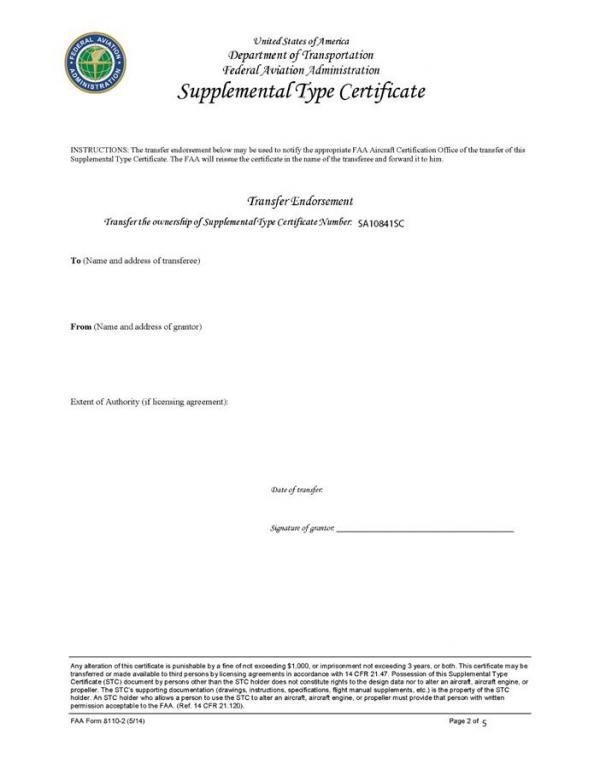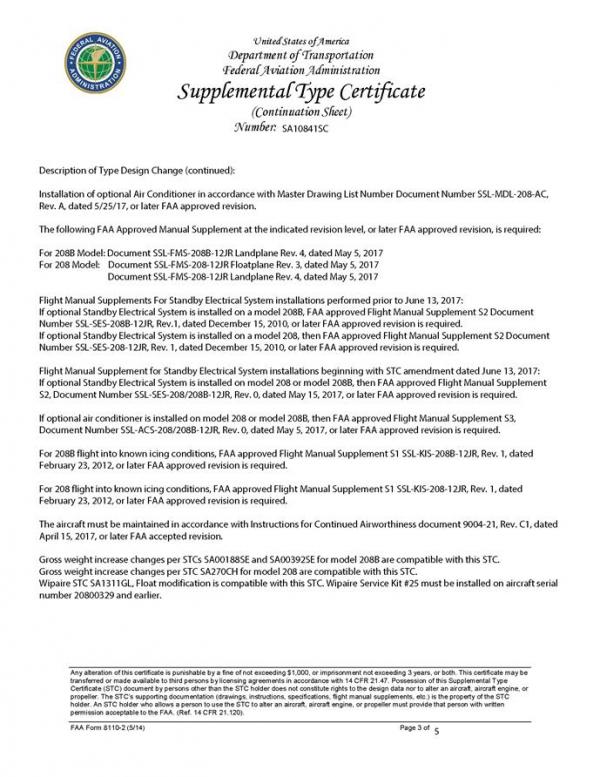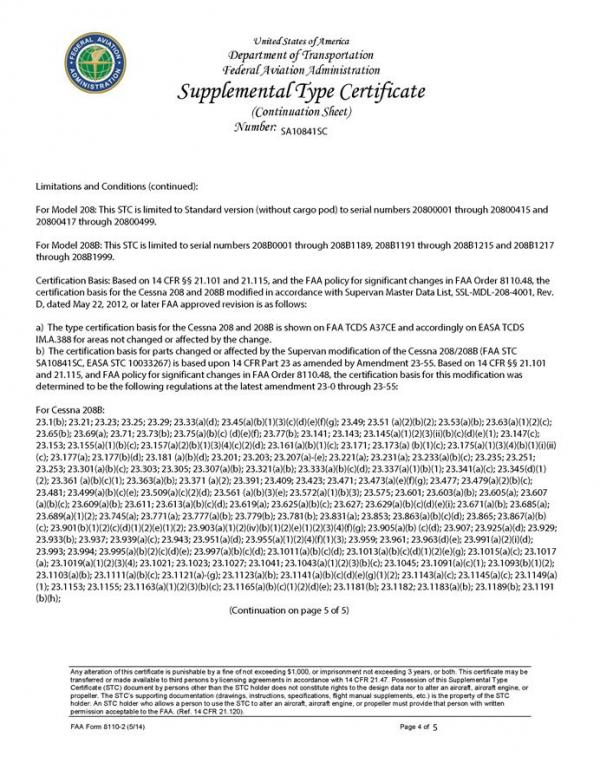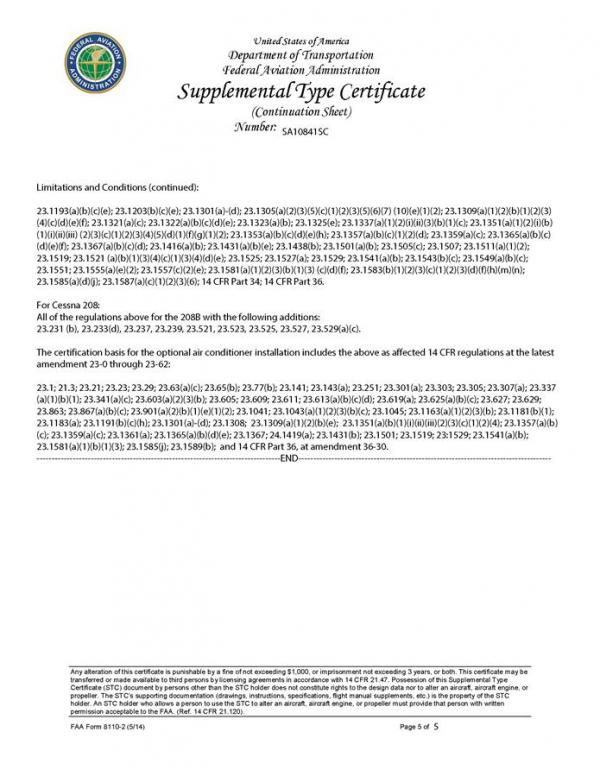NCR-017-2017
Pursuant to subsection 5.9(2) of the Aeronautics Act and after taking into account that the exemption is both in the public interest and is not likely to adversely affect aviation safety, I hereby exempt Canadian air operators from the requirements of paragraphs 723.22(1)(a) and (b), and 723.22(2)(f) of the Commercial Air Service Standards (CASS) made pursuant to subsections 703.22(1) and (2) of the Canadian Aviation Regulations (CARs), subject to the conditions set out below.
Details of subsections 703.22(1) and (2) of the CARs and paragraphs 723.22(l)(a), (b), and 723.22(2)(f) of Standard 723 - Air Taxi - Aeroplanes are stated in Appendix A.
Purpose
Current paragraph 723.22(l )(a) of the CASS permits only factory built single engine turbine powered aeroplanes to transport passengers at night Visual Flight Rules (VFR) or in Instrument Flight Rules (IFR) condition. (This air transport service is abbreviated as Single-Engine Instrument Flight Rules (SEIFR) in this exemption). This regulation has proven to be very restrictive and specific in its application. It disqualifies the same factory built single engine turbo-prop aeroplane retrofitted with a better performing turbo-prop engine from being given SEIFR authority.
This exemption provides relief from this regulation by granting SEIFR authority to Canadian air operators to operate Cessna Caravan model 208 and 208B aeroplanes retrofitted with Honeywell TPE331-12JR turboprop engine in accordance with the Federal Aviation Administration (FAA) Supplemental Type Certificates (STC) SA02291AK or SA10841SC (see Appendix B and C respectively) and in full compliance with the conditions set out below.
Application
This exemption applies to Canadian air operators operating a Cessna Caravan 208 and 208B model, retrofitted with Honeywell TPE331-12JR turboprop engine in accordance with the FAA STC # SA02291AK / SA10841SC, conducting SEIFR operations.
This exemption ceases to apply to a Canadian air operator who breaches any condition of the exemption.
Conditions
This exemption is subject to the following conditions:
- The Air operator shall ensure that the Cessna Caravan 208 and 208B model is retrofitted with the Honeywell TPE331-12JR turbo-prop engine in accordance with the FAA issued STCs number SA02291AK or SA10841SC;
- The air operator shall ensure that the aircraft is in conformity with its continued airworthiness requirement, compliant with the aircraft Type Certificate Data Sheet (TCDS) and STC requirements; adherence with the applicable Airworthiness Directives, Service Bulletins and any other relevant airworthiness and maintenance safety requirement;
- The air operator shall comply with the conditions and limitations specified in the STCs (see Appendix B and Appendix C) according to which the conversion was carried out;
- The air operator shall be compliant with the requirements of subsection 703.22(2) of the CARs;
- Except for paragraphs 723.22(1)(a), (b) and 723.22(2)(f) of the CASS, the air operator shall meet all the other requirements of section 723.22 of the CASS, as applicable;
- The air operator shall include in its training program the requirements of subsection 723.98(24) of the CASS and include all the other requirements of this section as applicable, to ensure their flight crew members are trained and tested according to the prescribed standards, and are competent to operate Honeywell TPE331-12JR powered Cessna Caravan 208 and 208B models in SEIFR operations;
- The air operator's training program shall include syllabus covering Honeywell TPE331-12JR turbo-prop engine systems, normal/abnormal/emergency operations and its limitations, including the Negative Torque Sensing (NTS) system fitted on this engine;
- The air operator shall, in conformity with subsection 726.07(2) of the CASS (see Appendix A), include in its maintenance control manual the engine trend monitoring or equivalent procedure, as recommended by the engine manufacturer, to identify any deterioration in engine performance and reliability issue, and take immediate remedial action;
- The STC holder shall monitor all In Flight Shut Down (IFSD) occurrence of the subject engine model and shall inform Commercial Flight Standards (AARTF) and Operational Airworthiness (AARTM), Transport Canada Civil Aviation (TCCA), of any such event, and where the cause of which is not determined, has 90 days (maximum) to investigate the cause, failing which this exemption shall be terminated;
- The STC holder shall monitor the in-flight shutdown (IFSD) rate of the subject engine model using a rolling window of 100,000 hours in service, calculate the value per 1000 hours, and depict them as spot values on a monthly basis and at each instance of an IFSD. Where the IFSD rate is higher than 0.01/1000 hours in service, it is over the acceptable threshold. The STC holder shall inform Commercial Flight Standards (AARTF) and Operational Airworthiness (AARTM), TCCA of any rates that are over this acceptable threshold and any such spike shall terminate the exemption;
- This exemption shall terminate where there are more than two IFSD occurrences involving the same engine model within a 12 month period. IFSD shall include all engine or systems related causes.
Validity
The exemption is in effect from September 1, 2017, until the earliest of the following:
- August 31, 2022 at 23:59 EDT; or
- the date on which this exemption is cancelled, in writing, by the Minister, where he is of the opinion that it is no longer in the public interest or that it is likely to adversely affect aviation safety.
Dated at Ottawa, Ontario, Canada, this 31 day of August, 2017, on behalf of the Minister of Transport.
Original signed by
Robert Sincennes
Director, Standards
Transport Canada, Civil Aviation
Appendix A
Relevant provisions of the Regulations and Standards: CARs and CASS
Canadian Aviation Regulations (CARs)
703.22: Transport of Passengers in Single-Engined Aircraft
- (1) Subject to subsection (2), no air operator shall operate a single-engined aircraft with passengers on board in IFR flight or in night VFR flight.
- (2) An air operator may operate a single-engined aircraft with passengers on board in IFR flight or in night VFR flight if the air operator
- (a) is authorized to do so in its air operator certificate; and
- (b) complies with the Commercial Air Service Standards.
Commercial Air Service Standards (CASS)
723.22 Transport of Passengers in Single-Engined Aeroplanes
The standard for transport of passengers in a single-engined aeroplane under IFR or VFR at night is:
- (1) General
- (a) only factory built, turbine-powered aeroplanes are permitted;
- (b) the turbine-engine of the aeroplane type must have a proven Mean Time Between Failure (MTBF) of .01/1000 or less established over 100,000 hours in service; and
- (c) pilot training in accordance with subsection 723.98(24).
- (2) Aeroplane Equipment Requirements
- (a) to (e) ……….
(f) a manual throttle which bypasses the governing section of the fuel control unit and permits continued unrestricted operation of the engine in the event of a fuel control unit failure; - (g) to (i) ……….
726.07 Quality Assurance Program
- (1) ………….
- (2) Where the air operator carries passengers in single engine aircraft under IFR or VFR at night pursuant to subsection 703.22(2), the program shall include engine trend monitoring or equivalent procedures to identify any deterioration in engine performance and reliability.
- (3) and (4) ............
Appendix B
Appendix B contains a scanned version of a certified copy of Supplemental Type Certificate, Number SA02291AK, issued in the United States of America by the Department of Transportation – Federal Aviation Administration, issued on July 16, 2007 and amended February 25, 2009, June 11, 2010 and January 18, 2013. This Certificate is issued to Aero Twin, Inc., 2403 Merrill Field Dr, Anchorage, AK 99501 and certifies that the change in type design for Product number: A37CE, Make: Cessna and Model: 208, 208B along with the numerous limitations and conditions listed meets the airworthiness requirements of Part 23 of the Federal Aviation Regulations.
Description of Type Design Changes - Installation of Honeywell TPE331-12JR turbine engine and Hartzell HC-B4TN-5QL/LT10890N(K) or HC-B4TN-5QL/LT10891N(K) propeller, and associated structure and equipment in accordance with Aero Twin, Inc., Master Descriptive Data List, 850-MDDL, Issue 10, dated May 14, 2012, or later FAA approved revision.
There are fourteen “limitations and conditions” listed for this Type Certificate.
Appendix C
Appendix C contains a scanned version of a certified copy of Supplemental Type Certificate, Number SA10841SC, issued in the United States of America by the Department of Transportation – Federal Aviation Administration, issued on November 26, 2008, reissued on July 30, 2012 and January 24, 2013 and amended on June 15, 2009; July 8, 2010; December 15, 2010; June 11, 2012; and June 13, 2017. This Certificate is issued to Supervan Systems Ltd., 8955 CR 135, Celina, TX 75009 and certifies that the change in the type design for Product number: A37CE, Make: Textron Aviation, Inc., Model: 208 and 208B Caravan along with the list of limitations and conditions listed meets the airworthiness requirements of Part 23 of the Federal Aviation Regulations.
Description of Type Design Change: The modification consists of removal of the Pratt & Whitney PT6A-114/114A engine, propeller and associated components to install a Honeywell TPE331-12JR engine, Hartzell HC-B4TN-5QL/LT10890NK (de-ice) or HC-B4TN-5QL/LT10890K (non de-ice) or HC-B4TN-5NL/LT10981N (de-ice) propeller and associated components in accordance with Supervan Master Data List SSL-MDL-208-4001, Rev. D, dated May 22, 2012, or later FAA approved revision.
Third-Party Information Liability Disclaimer
Some of the information on this Web page has been provided by external sources. The Government of Canada is not responsible for the accuracy, reliability or currency of the information supplied by external sources. Users wishing to rely upon this information should consult directly with the source of the information. Content provided by external sources is not subject to official languages, privacy and accessibility requirements.
- Date modified:
